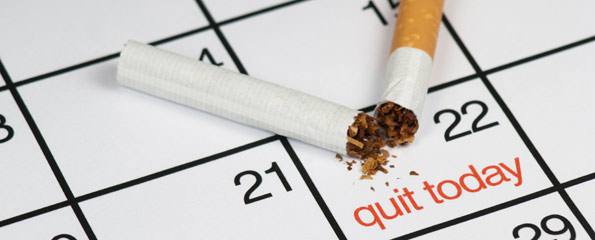Many smokers worry that they'll gain weight if they try to quit. Some even use that concern as a reason not to quit.
"That's a bad idea for many reasons," says Scott McIntosh, PhD, associate professor of community and preventive medicine at the University of Rochester in New York and director of the Greater Rochester Area Tobacco Cessation Center. “Not every smoker who quits gains weight.” Even those who do, he points out, gain on average just 4 to 10 pounds.
Indeed, for many ex-smokers, putting on a few pounds is healthy. Research shows that smoking actually makes some people unhealthily thin.
Still, if you're worried, remember this: a few simple strategies can help limit weight gain while you kick the habit. Once you have successfully broken the addiction to tobacco, you can work on losing any weight you've gained.
Smoking and Metabolism
Research shows that nicotine from tobacco boosts the body'smetabolic rate, increasing the number of calories it burns. Immediately after you smoke a cigarette, your heart rate increases by 10 to 20 beats a minute. The unnatural stimulant effect of nicotine is one reasonsmoking causes heart disease.
When smokers quit, metabolic rate quickly returns to normal. That's a healthy change. But if ex-smokers keep getting the same number of calories as before, they put on pounds.
Be Smart About What You Put in Your Mouth
When smokers quit, nicotine isn't all they crave. They also discover that they miss the habit of lighting a cigarette and putting it to their mouths. Many smokers turn to food to satisfy this so-called need for "oral gratification."
That's fine if it helps you to quit. But by choosing low-calorie or zero-calorie foods, you can avoid putting on weight. Some smart alternatives include:
- Sugar-free gum
- Sugar-free hard candies
- Celery or carrot sticks
- Sliced sweet peppers
- Slices of jicama
Experiment to find which alternatives work best for you. Research shows that some smokers who quit experience a sharpened "sweet tooth." They're better off finding foods sweetened with artificial sugar. Some smokers really miss the oral gratification of smoking. They do best finding alternatives that require unwrapping something and chewing or sucking on it, such as sugar-free gum and hard candy.
Another trick is to brush your teeth frequently throughout the day. This can satisfy a passing craving for oral gratification. When yourmouth is fresh and clean, you may have less of an urge to smoke.
Avoid Crash Diets
Choose healthy foods that are rich in nutrients and low in calories whenever you can. But experts advise against radical changes in how you eat. “Quitting is tough enough without adding the stress of extreme dieting,” says Steven Schroeder, MD, director of the Smoking Cessation Leadership Center at the University of San Francisco.
Be Realistic in Your Expectations
Many smokers do gain some weight. It’s fine to resolve to do everything you can to keep your weight down. But don’t make weight a make-or-break issue. “It’s important to tell yourself right at the beginning that it’s OK to put on some weight,” says McIntosh. “Don’t be too tough on yourself.”
Stay Busy
To distract yourself from the urge to smoke, fill your day with things to do that don't involve eating. Physical activities -- walking, gardening,doing chores -- are a great choice. They burn calories, of course. And research shows that they also have a positive effect on mood. But any kind of distraction from the urge to smoke will help. Examples include:
- Watching a movie
- Attending a concert
- Going to the library to read
- Visiting a local museum
- Calling a friend
- Volunteering
“Fortunately, it's easier than ever to find smoke-free places to go these days,” says Schroeder. “That trend has helped to make it easier for smokers to quit.”
Talk With Your Doctor
A variety of products and medications are available that have been found to help smokers quit. Several also appear to help quitters keep weight off. In a 2009 review, researchers found that the antismoking drug buproprion and the antidepressant fluoxetine, as well as nicotine replacement therapies and cognitive behavioral therapy, helped limit the amount of weight that smokers gained while quitting.
Keep Your Health in Perspective
If you do gain extra pounds while you kick the habit, don't let that derail your efforts. “By quitting smoking, you can add years to your life -- and years of being in good health rather than sick and disabled,” says McIntosh. “Those extra pounds are a small price to pay.” Once you’re tobacco-free, you’ll have plenty of time to get into shape and achieve a healthy weight.
Source
http://www.webmd.com/smoking-cessation/features/quit-without-weight-gain__
SOURCES:
Steven Schroeder, MD, director, Smoking Cessation Leadership Center, University of San Francisco.
Scott McIntosh, PhD, associate professor of community and preventive medicine, University of Rochester, New York; director, Greater Rochester Area Tobacco Cessation Center.
Tobacco Research and Intervention Program, H. Lee Moffitt Cancer Center & Research Institute, University of South Florida: “Forever Free.”
Parsons, A. Cochrane Database of Systematic Reviews, 2009; issue 1.
Department of Health and Human Services: “Exercise and Weight Control.”
Reviewed on January 24, 2011
© 2011 WebMD, LLC. All rights reserved.





No comments:
Post a Comment